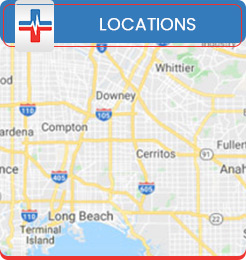Bladder Infections Treatment Clinic Q&A
A bladder infection, or cystitis, is a common urinary tract infection that causes pain and a frequent urge to urinate. It’s often caused by bacteria entering the urethra and can be easily treated with antibiotics. If left untreated, the infection can spread to the kidneys, leading to more serious health issues. Our team of medical professionals at Reddy Urgent Care clinics can help you if you are dealing with a bladder infection or other UTI. Contact us for all your urgent care needs or simply walk in. No appointments are necessary. We have convenient locations to serve you in Bixby Knolls Long Beach, Downtown Long Beach, and Paramount, CA.


Table of Contents:
What are the first signs of a bladder infection?
What is the most common cause of bladder infection?
What is the difference between a UTI and a bladder infection?
What are the signs of a bladder or kidney infection?
A bladder is one of the types of urinary tract infection or UTI. These are infections that are associated with the urinary tract including kidney, and urethra infections. Urinary tract infections are most often caused by bacteria entering the urinary tract through the urethra. This bacteria will multiply in the bladder and cause an infection
There are 7 signs that you may have a bladder infection and these include:
1. A painful burning sensation when you urinate.
2. The need to urinate frequently.
3. Having an overwhelming need to urinate fast.
4. Abdominal pain, pressure, or tenderness in the pubic area is common. If the pain moves into your lower back, then it may indicate that the infection has spread into the kidneys.
5. If your urine is cloudy or bloody. Cloudy-colored urine is common with bladder infections. Sometimes red blood cells will leak from the kidneys during a bladder infection causing blood in the urine.
6. Strong smelling urine. This can be either ammonia or sweet-smelling.
7. If you have a fever with the other symptoms: on its own, it is not necessarily an indicator.
These symptoms indicate that you may have a UTI and should see a doctor.
Bladder infections are most often caused by bacteria entering the bladder and multiplying. The urinary tract is designed to keep the bacteria out but isn’t always successful. Bladder infections happen mostly in women.
Bladder infections (cystitis) are usually caused by E. coli bacteria. This is a bacteria that is found in the gastrointestinal tract. There are practices that can make it easy for these bacteria to enter the urinary tract. Sexual intercourse is one. Another has to do with the anatomy of women due to the short distance between the anus and the urethra.
UTIs are infections of the urinary tract. The ureters, urethra, bladder, and kidneys are all parts of the urinary tract. If the kidneys become infected it is a serious infection. A bladder infection affects only the bladder but is still considered to be a UTI.
It can be difficult to determine which specific UTI a person has because some of the symptoms are similar for each. While the symptoms can be the same, treatment for most UTIs is done with antibiotics. The sooner a person gets treatment the quicker they will get better. Treating the infection sooner will reduce the chance that the infection will become serious and spread to the kidneys or other parts of the body.
Kidney infections and bladder infections will manifest different symptoms. It is not uncommon for a bladder infection if left untreated to move into the kidneys and become a more serious type of infection.
A kidney infection will have the following symptoms:
1. Back pain or pain in the side.
2. High fever
3. Nausea
4. Chills and shaking
5. Vomiting
A bladder infection will have the following symptoms:
1. Pelvic pressure
2. Frequent and painful urination
3. Lower abdomen discomfort
4. Blood in the urine
When UTIs are treated promptly and correctly, they rarely lead to complications. Left untreated serious complications can arise. These complications can include:
1. Recurring infections, especially in women who have two or more UTIs in a 6-month period or 4 or more in a year.
2. Permanent kidney damage can occur from a chronic kidney infection left untreated.
3. The increased risk of giving birth prematurely or with a low birth rate if pregnant.
4. Developing a narrow urethra in men.
5. Developing sepsis is a potentially life-treating health complication.
Get the medical attention you need today and visit us to meet with our team of medical professionals. For more information, contact us. We serve patients from Bixby Knolls Long Beach CA, Downtown Long Beach CA, Paramount CA, Lakewood CA, Rossmoor CA, Carson CA, Bellflower CA, Lynwood CA, Norwalk CA, and surrounding areas.
Check Out Our 5 Star Reviews






